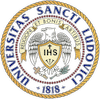
Overview
Founded in 1818, the Saint Louis University is a non-profit private higher education institution located in the urban setting of the medium city of St. Louis (population range of 250,000-499,999 inhabitants), Missouri. This institution also has a branch campus in Madrid. Officially accredited by the Higher Learning Commission, Saint Louis University (SLU) is a large sized (uniRank enrollment range: 10,000-14,999 students) coeducational US higher education institution formally affiliated with the Christian-Catholic religion. Saint Louis University (SLU) offers courses and programs leading to officially recognized higher education degrees such as pre-bachelor's degrees (i.e. certificates, diplomas, associate or foundation), bachelor's degrees, master's degrees and doctorate degrees in several areas of study. See the uniRank degree levels and areas of study table below for further details. This 206-year-old US higher-education institution has a selective admission policy based on entrance examinations and students' past academic records and grades. The acceptance rate range is 70-79% making this US higher education organization a moderately selective institution. International students are welcome to apply for enrollment. SLU also provides several academic and non-academic facilities and services to students including a library, housing, sports facilities, financial aids and/or scholarships, study abroad and exchange programs, online courses and distance learning opportunities, as well as administrative services.
University Snapshot
Control
![]() private
private
Entity
![]() non-profit
non-profit
Size
![]() large sized
large sized
Selectivity
![]() moderately selective
moderately selective
University Identity
| Name | Saint Louis University |
|---|---|
| Name (English) | |
| Name (Non Latin) | |
| Acronym | SLU |
| Founded | 1818 |
| Motto | Ad Majorem Dei Gloriam For the greater glory of God |
| Colours | Blue and white |
| Mascot | Billikens |
| Screenshot |  |
| Video Presentation |
